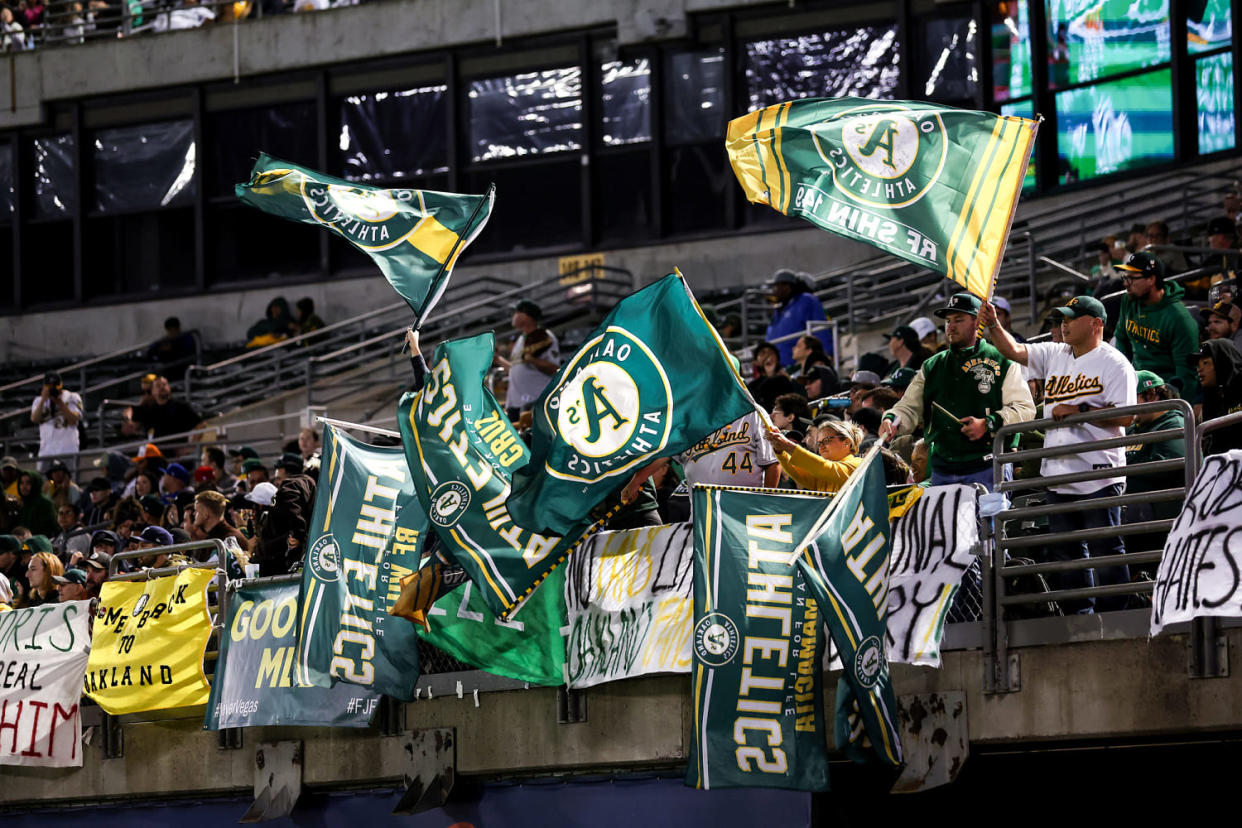The Oakland Coliseum before an Athletics game against the Cleveland Guardians on March 28.
OAKLAND, Calif. — Before sunset Thursday, there will be no more “there there” for major professional sports in this Bay Area city.
The Oakland Athletics will cease to be Oakland’s Athletics after the matinee game against the Texas Rangers at 12:37 p.m. PT Thursday. The matchup will be the club’s final home game at the venerable Oakland Coliseum.
The team, which has called Oakland home since 1968, announced last year that it plans to build a stadium in Las Vegas by spring 2028. In the meantime, the franchise will move to a minor league park in West Sacramento for at least three seasons, because Oakland stadium operators and the club couldn’t agree to a lease extension beyond this season. During that interim stay, the team will just be known as “The Athletics.”
“It’s been a slow death, like going to the doctor and being told you have two years to live,” said former state Senate President Pro Tem Don Perata, once one of the East Bay’s most powerful politicians of the 1990s and the early 2000s. “There have been so many losses in Oakland, and I think this is the bottom.”
A’s fans, equally outraged and heartbroken, have focused their anger squarely on one target: reviled owner John Fisher, heir to the Gap clothing fortune.
Fisher last year abruptly cut off talks with Oakland about a possible new waterfront stadium. But even before that, A’s fans despised Fisher for consistently keeping the team’s payroll at the bottom of the league and letting talented players leave via free agency.

Fans wave A’s flags during a game against the Texas Rangers at the Oakland Coliseum on Tuesday.
Fisher had floated proposals to build a new A’s stadium near Oakland’s Laney College or in suburban Fremont or San Jose — none of which ever got far. But the most recent effort appeared to be progressing before he pulled the plug.
A’s fans don’t believe Fisher did enough to invest in the team or find a way to stay in Oakland. As a result, he has faced pressure to sell to any number of interested Bay Area suitors who have pledged to keep the team in Oakland.
Green T-shirts with the word “SELL” have become A’s fans’ de facto uniform, and “sell the team” chants can often be heard at games, even on the road.
KGO-TV sports anchor Larry Beil voiced many fans’ long-festering anger at Fisher on Monday when he went off on an open letter the reclusive owner sent to fans apologizing and explaining his motives. Fisher’s message about the failed efforts to build a new A’s stadium in Oakland: “We tried.”
Beil called it “a great work of fiction.”
“John, you’re a serial penny pincher,” he said. “You’ve destroyed your family’s great name and legacy because of your cheapness.”
Former A’s pitcher Trevor May also lashed out at Fisher for hiding behind a canned statement.
“With all due respect, which is more than you likely deserve, save it. Be an adult. Get in front of a camera and say it with your chest,” May said of Fisher’s statement, which included an embarrassing typo — a reference to the Loma “Preita” earthquake, which rocked the 1989 World Series.
“You love owning stuff, just not your actions,” May wrote.
A representative for Fisher could not be immediately reached for comment.
Oakland appeared to be on solid sports footing several decades ago, with the NFL’s Raiders back in town, the A’s approaching their “Moneyball” greatness and the Golden State Warriors enjoying a renovated state-of-the-art arena.
The A’s will be the last of those three to leave a city that once inspired a young Gertude Stein, played a key distribution role in World War II and gave rise to the Black Panthers.
The Raiders left for Los Angeles in 1982, came back to Oakland in 1995 and then uprooted for Las Vegas 2020.
The Golden State Warriors moved across the bay to San Francisco’s Chase Center starting in the 2019-20 season after having played in Oakland since 1971.
Oakland even briefly had an NHL team: the California Golden Seals, which entered as an expansion franchise in 1967 and played nine seasons in Oakland before moving to become the Cleveland Barons, which ceased operations after two seasons.
Oakland native and former MLB player Bip Roberts, now a real estate investor in the East Bay, said he doesn’t buy the argument that his hometown lacks the audience or money to support a major-league team.
“Everything is in place for you to be successful” in Oakland, Roberts said. “When you think about those of us who have grown here, those of us who live here, we can afford to go to any sporting event regardless to the ticket price, right? To leave a large market such as this one and you go to a smaller market [Sacramento] and then to even a smaller market [Las Vegas], it’s not a great business deal, in my opinion.”
More Sports from NBC News
Oakland’s median household income, $96,828, and that of Alameda County, $119,931, both top state ($95,521) and national ($80,610) figures, according to the most recent census data. They are lower, however, than San Francisco’s median household income, $126,730, and those of nearby Marin ($139,644) and San Mateo counties ($151,485).
However, Las Vegas has evolved into a kind of sports capital in recent years. The city — which will have the A’s, the Raiders and the NHL’s Golden Knights — hosted its first Super Bowl seven months ago, and last year it hosted the Stanley Cup Final and a Formula 1 Grand Prix.
Vegas is also seen as a future destination for an expansion NBA franchise.
The A’s departure hands the San Francisco Giants full run of the Bay Area market, leaving New York, Chicago, the Washington D.C./Baltimore area and greater Los Angeles as the only remaining markets with two MLB clubs.
By on-the-field metrics, the A’s have historically been at least equal to the Giants. Through Tuesday night’s action, the Oakland A’s were 4,613-4,383 (.513), while the San Francisco Giants were 5,473-5,118 (.517).

Players mob Jacob Wilson on Tuesday as the Athletics defeated the Texas Rangers, 5-4, at the Coliseum in Oakland, Calif.
The A’s have won six American League pennants and four World Series, while the Giants have captured six National League pennants and three World Series. The A’s swept the Giants in the 1989 Fall Classic.
Yet it’s the Giants — potentially on their way to finishing .500 or worse in their seventh season out of eight — who are staying put. The fifth most valuable club in baseball with an estimated worth of $3.8 billion, the Giants play in one of MLB’s most beloved ballparks, which has helped the team blow the A’s out of the bay in attendance since Oracle Park opened in 2000.
A’s fans, repulsed by Fisher’s move, have stayed away in droves this season. The franchise is dead last in attendance across MLB, averaging just 10,635 fans per game.
Roberts pinned the blame on A’s management. Even before Fisher and real estate developer Lewis Wolff bought the team in 2005, the franchise had a well-earned reputation for focusing on its bottom line at the expense of keeping talent long-term.
Prime examples of stars lost include Reggie Jackson in the ’70s, Mark McGwire in the ’90s and Jason Giambi in the early 2000s. More recently, East Bay native Marcus Semien left as a free agent in 2021, then won a World Series ring with the Texas Rangers last year.
“That was something that’s been ingrained in the organization, to get these players to have such a following and backing in the city, and then they’re gone,” Roberts said. “And I think it just wore on people.”
As the final A’s game approaches and fans share memories of the Oakland Coliseum across social media and elsewhere, the depth of the loss is setting in, he added.
“I’m starting to get saddened about what’s about to happen,” Roberts said. “I’ve been putting off emotions for a long time.”
Dana Varinsky reported from Oakland, and David K. Li from New York City.
Copyright for syndicated content belongs to the linked Source link








